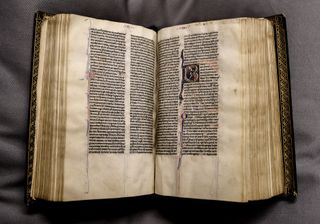
Rare Medieval Bible Returned to Canterbury Cathedral 500 Years After It Was Lost

A pocket-size, 13th-century Bible was just returned to the library of England's Canterbury Cathedral, after being "lost" for 500 years.
The medieval Bible was lost during the 16th century, when Henry VIII ruled England and led the English Reformation that divided the Church of England from the Roman Catholic Church. At that time, hundreds of monasteries were disbanded, including that of the Canterbury Cathedral. [Fossil Record: A Gallery of "Bugged" Medieval Books]
This Bible and most of the 30,000 volumes that the cathedral's book collection once held were scattered and lost, according to The Guardian. In fact, only 30 volumes from the original collection are still held at the library, according to a statement from the Canterbury Cathedral.
In July, the Cathedral bought the Bible from a rare book sale in London for 100,000 pounds (about $130,000), using grants from the National Heritage Memorial Fund and other small donations.
The medieval Bible — known as the Lyghfield Bible, after a monk it once belonged to — was probably produced in Paris, one of the major medieval hubs for such work, according to the statement. It is written in Latin on tissue-like parchment and contains extensive decorations, and it is the only complete Bible in the cathedral's medieval book collection.
The Lyghfield Bible and the other ancient texts held at the cathedral are now on the UNESCO UK Memory of the World Register, and the cathedral plans to put the book on display for people to see.
Originally published on Live Science.
Sign up for the Live Science daily newsletter now
Get the world’s most fascinating discoveries delivered straight to your inbox.
p.p1 {margin: 12.0px 0.0px 3.0px 0.0px; font: 12.0px Arial}

Yasemin is a staff writer at Live Science, covering health, neuroscience and biology. Her work has appeared in Scientific American, Science and the San Jose Mercury News. She has a bachelor's degree in biomedical engineering from the University of Connecticut and a graduate certificate in science communication from the University of California, Santa Cruz.
